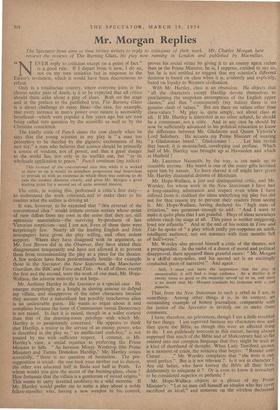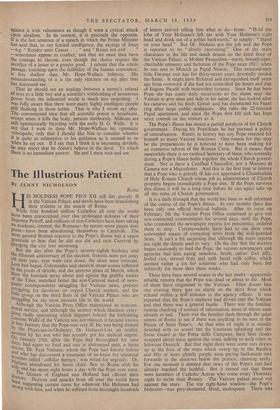Mr. Morgan Replies
The Spectator from time to time invites writers to reply to criticisms of their work. Mr. Charles Morgan here reviews the reviews of The Burning Glass, his play now running in London and published by Macmillan.
is a good rule. If I depart from it now, 1 do so, not on my own initiative but in response to the Editor's invitation, which it would have been discourteous to refuse.
Only in a totalitarian country, where everyone joins in the chorus under pain of death, is it to be expected that all critics should think alike about a play of ideas. Both on the stage and in the preface to the published text, The Burning Glass is a direct challenge to many ideas—the idea, for example, that every increase in man's power over nature is necessarily beneficent—which were popular a few years ago but are now being called into question by the scientific as well as by the Christian conscience.
The kindly critic of Punch states the case clearly when he says that the young scientist in my play is " a man too perceptive to be dazzled by the gigantic excitements of his
This reversal of the conventional idea that while it is wicked to blow us up it would be somehow progressive and benevolent to provide us with an existence in which there was nothing to do puts the modern dilemma clearly, and gives Mr. Morgan a good starting point for a second act of quite unusual tension.
proves his social virtue by giving it to an enemy agent rather than to the Prime Minister, he is, I suppose, entitled to say so, but he is not entitled to suggest that my scientist's different decision is based on class when it is, evidently and explicitly, based on loyalty to Western civilisation.
With Mr. Hartley, class is an obsesion. He objects that " all the characters except Hardlip devote themselves to proclaiming the unspoken assumptions of the English upper classes," and that "consequently (my italics) there is no genuine clash of values." But are there no values other than class-values ? My play is, quite simply, not about class at all. If Mr. Hartley is interested in no other subject, he should be a commissar, not a critic. And in any case he should by now be sufficiently advanced in his political education to know the difference between Mr. Gladstone and Queen Victoria's Lord Salisbury. He accuses my Prime Minister of wearing " a Gladstonian beard." Gladstonian ! . . . Let him revisit that beard; it is moustached, enveloping and profuse. Which half of Mr. Hartley was brought up at Hawarden and which at Hatfield ?
Mr. Laurence Naismith, by the way, is not made up to resemble anyone. His beard is one of the many gifts lavished upon him by nature. To have shaved it off might have given Mr. Hartley distastefuL dreams of Blenheim. against it with vehemence as though it were a cynical attack upon idealism. In its context, it is precisely the opposite. It is the last sentence of a speech in which the Prime Minister has said that, to our limited intelligence, the sayings of Jesus —e.g. " Render unto Caesar . . . " and " Resist not evil . . . " —sometimes appear to conflict; and that we must then have the courage to choose, even though the choice require the sacrifice of a lesser to a greater good. I submit that the whole passage, touching upon the fallibility of the human conscience, is less shallow than Mr. Hope-Wallace believes. His, misunderstanding of it is the only stricture on my play that has distressed me.
That he should see an analogy between a -nanny's refusal of toys to a little boy and a scientist's withholding of monstrous Power from the industrial world is much less surprising. I was fully aware that there were` many highly intelligent people still thinking in those terms. That is why I wrote my play. The conventional idea that all scientific power is beneficent, except when it kills the body, persists stubbornly. Millions are still optimistically bicycling with the early H. G. Wells. It is not that I wish to deny Mr. Hope-Wallace his optimistic velocipede; only that I should like him to consider whether it is quite as submissive to his guidance as it seemed to be when he set out. If I say that I think it is becoming devilish, he may retort that he doesn't believe in the devil. To which there is no immediate answer. He and I must wait and see.



































 Previous page
Previous page